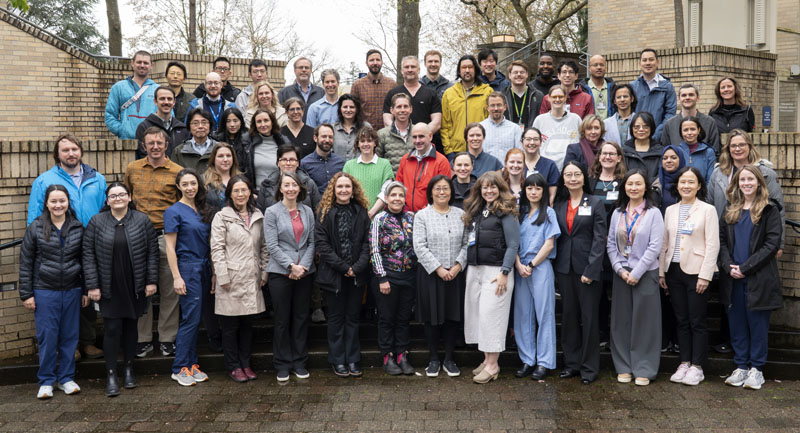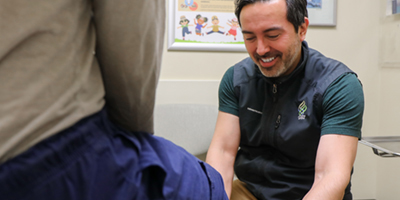About Us
Welcome to the OHSU Department of Pathology and Laboratory Medicine!
Pathology and Laboratory Medicine is a dynamic academic department, providing world-class clinical care to our patients, fostering expanded basic science and research programs, innovating pathology education, and pursuing new advancements in patient care, teaching, and research. Using technology such as remote frozen section interpretation, we are improving turnaround times and the work-life balance of our physicians. Our collaborative work environment includes a junior faculty mentorship program, internal leadership opportunities, annual faculty retreat, faculty workgroups, and regular opportunities to share feedback and ideas as we strive for continuous program improvement. Our learners are integral members of our department, and our faculty are passionate educators. Collegiality, collaboration and a love of learning define us as a team of academic physicians and physicians in training.
Education
We pride ourselves on our enthusiastic, dedicated teachers, the comradery in our learners, and our devotion to the best of academic medicine. We offer an excellent residency program and seven subspecialty fellowships. Our educational offerings also include the unique Pathology Student Fellowship, four medical student electives, and a pathology interest group. Our CME program regularly invites nationally recognized visiting speakers.
Clinical Care
Our pathologists provide exceptional diagnostic care for patients in OHSU Hospital, OHSU Clinics, Doernbecher’s Children’s Hospital, Portland Veterans Affairs Medical Center, and Shriner’s Hospitals for Children. In addition, we offer second opinions for patients as well as consultations for physicians throughout the Pacific Northwest and across the country. Our highly trained, subspecialized providers are devoted to providing state-of-the-art personalized medicine, integrating each patient’s detailed health history to form a precise diagnosis and contributing to the best possible prognosis.
Research
Research and research training are core pillars of the Department of Pathology and Laboratory Medicine at OHSU aligned with OHSU’s missions. Our research program ranges from cutting edge molecular pathology, hematologic malignancies, placental biology and disease, to cardiovascular disease, aging, as well as neurodegenerative disease. The Oregon Brain Bank is also housed in the Department.
Our goal is to understanding pathogenesis of disease, identifying novel diagnostic markers and therapeutic targets for improving patients’ outcome. The department strives to foster a culture that supports collaborations among basic scientists and clinicians on advancing translational discovery programs to facilitate the application of research innovations and discoveries to improve patient care.
Under the leadership of Dr. Guang Fan, Department Chair and Dr. Yabing Chen, Vice Chair for Research, our recent research efforts have focused on advancing digital pathology and promoting the application of machine learning and artificial intelligence in multidisciplinary research collaborations across Pathology and other departments and institutions at OHSU. Our faculty are also committed to research training and education of the next generation of scientists and pathologists, including residents, fellows, medical students, graduate students, and postdoctoral fellows
Support Pathology and Laboratory Medicine
Donate to academic programs in the Department of Pathology and Laboratory Medicine.

Department News
OHSU Pathology is hiring! If you can see yourself working in a thriving academic environment with truly great people in a spectacular city, we want to hear from you.
Academic Subspecialty Surgical Pathologist
Academic Hematopathologist
- Three of our Pathologist’s Assistants have been promoted from Instructor to Assistant Professor, recognizing their considerable contributions to our academic mission. Congratulations to Rikki Kotchik, Stephanie Reedal and Amelia Kerns!
- Dr. Chengyun Tang presented “Dementia in the Oldest-Old People: Uncovering the Role of Vascular Calcification by Machine Learner” at the Calcification-Omics, Molecular Elucidation, & Therapeutics (COMET) Scientific Symposium 2025, Boston, MA.
- Dr. Wonmo Ahn presented “ PRMT1 in Vascular Calcification” at the Calcification-Omics, Molecular Elucidation, & Therapeutics (COMET) Scientific Symposium 2025.
- Dr. Yabing Chen served as an invited speaker, panelist and session chair for three presentations at the American Heart Association Scientist Session 2025.
- Dr. Phil Raess recently spoke on MDS and AML in Challenges in Hematopathology: Tricky Differentials and Diagnostic Dilemmas, in interactive microscopy course at USCAP headquarters in Palm Springs.
- Dr. Matthew Wood has been appointed to the American Association of Neuropathologists Education Committee.
- Dr. Chenyun Tang has received a 2026 COMET Leducq Early Investigator Award (includes $25K funding and a 2027 conference presentation in England).
- Publication in Virchow’s Archive, first author Sintawat Wangsiricharoen titled “Superficial CD34-positive fibroblastic tumor with locoregional metastasis: a case report”.
- Publication in Modern Pathology featuring co-authors Nina Wakeman and Sintawat Wangsiricharoen titled “Expanding the Clinicopathologic Spectrum of EWSR1::SSX-Rearranged Sarcomas: Series of 11 Cases Including Osteosarcomas and a Novel EWSR1::SSX4 Fusion”
- Publication in Archives of Pathology & Laboratory Medicine, First author, Zhengchun Lu, coauthors including Rabeka Ali, Rhiannon Gall, Erandi Velazquez Miranda, Chengyun Tang, Marcela Riveros Angel, Vanderlene Kung, and Guang Fan: Retrospective Analysis of Human Papillomavirus Self-Collection for Cervical Cancer Screening in Community Outreach Programs.
